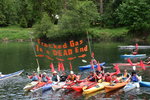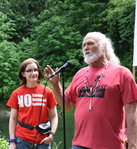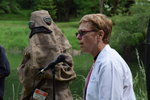


More than 100 people on land and dozens on the water in kayaks gathered at Camp Kalama RV Park May 18 to show their opposition to a proposed $2 billion methane-to-methanol refinery in Kalama, riding the momentum of Gov. Jay Inslee’s recent statements against the project.
Doctors, members of Native American tribes, local and regional activists and even Kalama Mayor Mike Reuter came to Camp Kalama to speak out against the plant. On the Kalama River, several kayakers held up a banner stating “fracked gas a dead end” — a reference to the feedstock that the proposed facility would use in making methanol.
Camp Kalama Owner Charlene DeRosier talked about the impacts a plant would have on her campground. A family-run business with the second and third generations now running the operations, she talked about the investments they have made on the land — planting trees and maintaining the campsite over the years.
DeRosier said the steam plume from the plant would be visible from any campsite, and chemical smells “would compete with campfires in our evenings and compete with bacon-frying in the morning hours.”
“For us at Camp Kalama, the handful of jobs this methanol plant would bring to the community in exchange for the lifetime of pollution and the risk of disaster — we say ‘no thanks, we’ll pass,’” DeRosier remarked.
“I’d like to raise my hands to Gov. Inslee,” Dakota Case, a Puyallup tribe member and “water warrior” said at the protest. Several of the speakers referenced Inslee’s recent change of tune regarding the plant. Whereas earlier on in the project’s development he was a supporter of it, on May 8 during a bill signing for legislation that would ban fracking he made a statement reversing his support.
Though Inslee’s statement was lauded by environmentalist groups, methanol plant supporters felt it had more to do with his current presidential bid where he has made fighting climate change his primary stumping point.
Cambria Keely, a 17-year-old student activist and lifelong Kalama resident, thanked all the supporters gathered, some from the city and many from around the region including some Clark County representation.
“Three years ago today we were a handful of dedicated citizens waving red signs on the corner just down the street,” Keely said.
Keely went on to speak from the perspective of someone who would have to live with the burden of climate change she said a dependence on fossil fuels would create.
“I refuse to raise my children in a world where they must witness the horrors of a worsening climate emergency,” she told the crowd.
Longview resident and St. Anne’s Episcopal Church in Washougal Rev. Kathleen Patton provided an anecdote based on a recent near-accident she witnessed on her way to work the previous week. She and other drivers encountered a family of geese crossing the road, and while some put on their brakes, one truck driver decided to switch lanes rather than stop.
The goose family managed to stop before entering the lane with the truck, Patton recounted. She likened the situation to what the methanol plant represented, a continuation of reliance on fossil fuels that would keep society hurtling toward a bleak future.
“Maybe once upon a time in the distant ‘80s … we once had the luxury of transitioning from one dirty fossil fuel to the other,” Patton said. “There’s no time for changing lanes. The collision is going to happen if we don’t pull up. Now is the time to stop and throw on those brakes.”